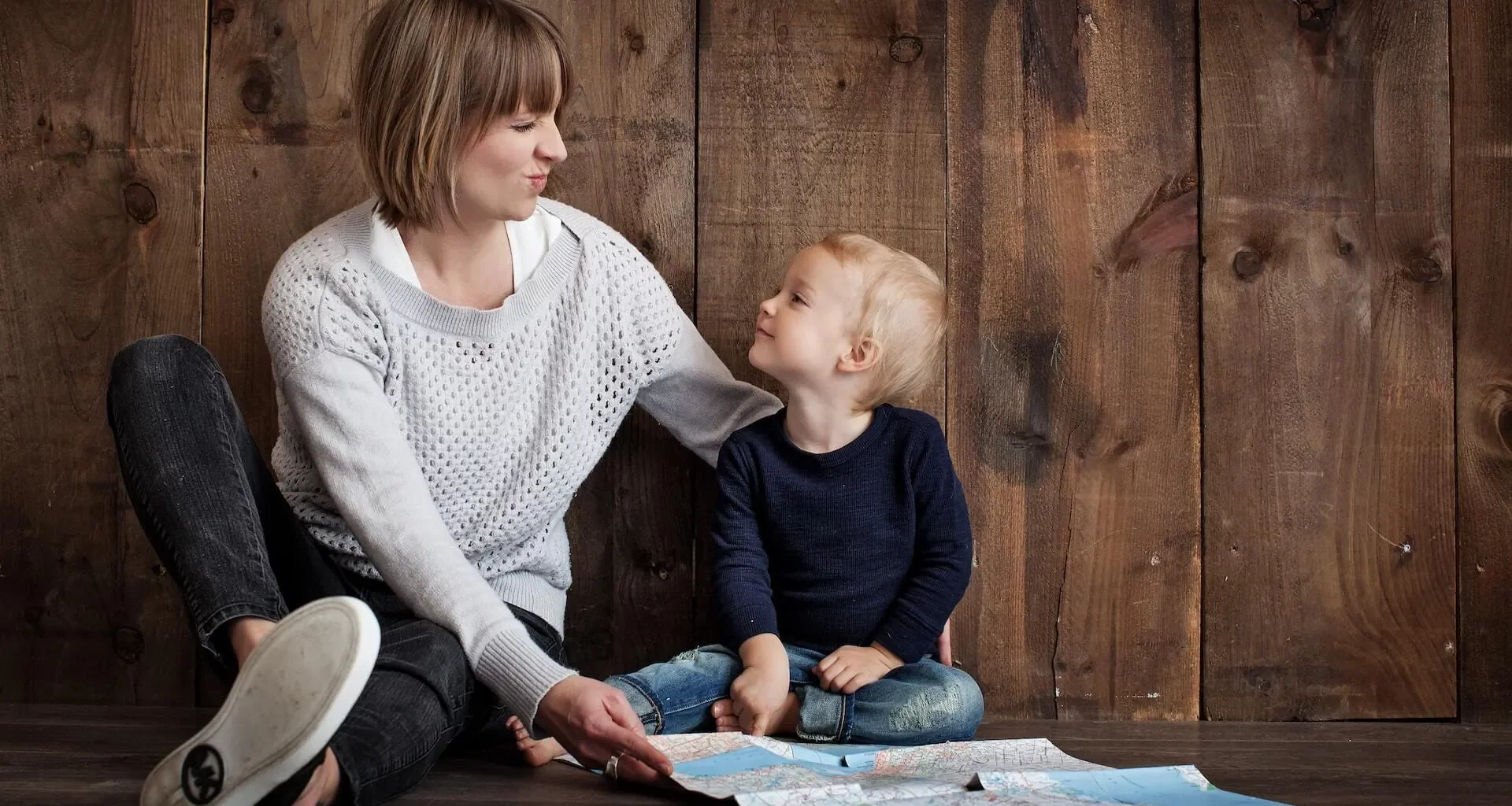In the whirlwind of modern life, parenting can often feel like a relentless journey filled with hurried moments and distractions. Yet, at its core, parenting is a profound and joyful experience that deserves our utmost attention. Welcome to our guide, “Journey to Mindful Parenting: 12 Strategies for Building a Strong Family Connection.” Here, we embark on a transformative journey to explore the art of mindful parenting. Here, you will discover a collection of invaluable strategies that empower you to forge deep and lasting connections with your children. By embracing mindfulness in your parenting approach, you can cultivate empathy, understanding, and emotional intelligence, nurturing a harmonious family environment where love, compassion, and growth thrive. Join us as we delve into the world of mindful parenting, offering insights, tips, and practices that will help you build a stronger, more connected family.
Table of Contents
- The Art of Mindful Parenting
- Understanding the Mindful Parenting Approach
- Creating a Mindful Family Environment
- Fostering Emotional Intelligence in Children
- Effective Communication with Your Child
- Mindful Discipline and Boundaries
- Balancing Self-Care and Parenthood
- Strengthening Family Bonds Through Mindfulness
- Teaching Gratitude and Compassion
- The Role of Empathy in Mindful Parenting
- Building Resilience in Children
- The Lifelong Impact of Mindful Parenting
- Frequently Asked Questions

The Art of Mindful Parenting
Mindful parenting is an approach rooted in the principles of mindfulness: being present, exhibiting non-judgment, and approaching situations with patience and compassion. For parents, this means truly being with their children in the present moment, without distractions, and engaging with them with full attention.
Benefits of Mindful Parenting
Studies have shed light on the advantages of this approach. A study found that mindful parenting not only improved parent-child interactions but also reduced parenting stress and child problem behaviors. By cultivating a calm and focused presence, parents are more equipped to respond rather than react to challenging situations, leading to a healthier familial environment.
Another study highlighted that the practice of mindful parenting is associated with better adolescent well-being, especially in terms of emotional regulation and behavior. Adolescents, undergoing a phase of immense growth and change, greatly benefit from the responsive and empathetic nature of mindful parenting.
Implementing Mindful Techniques
Parents can start by setting aside dedicated time to spend with their children without the interference of electronic devices or other distractions. This can be as simple as sharing a meal or reading a book together. The key is to be truly present, listening actively, and responding with patience and understanding.
Deep breathing exercises, meditation, and even brief moments of silence can be incorporated into daily routines, teaching children the importance of self-awareness and emotional regulation.
Mindful parenting offers a compass in the complex journey of raising children. By being present, patient, and compassionate, parents foster stronger bonds with their children and pave the way for healthier emotional and psychological development.
Understanding the Mindful Parenting Approach
Mindful parenting is a method that intertwines the practices and philosophies of mindfulness with the day-to-day challenges and rewards of parenting. It urges parents to bring conscious awareness to their interactions with their children, reacting with presence, attentiveness, and compassion rather than operating on auto-pilot or reacting impulsively.
The Science Behind Mindfulness in Parenting
The research underscores the effectiveness of a mindful approach to parenting. A study indicated that when parents practice mindfulness, they are likely to experience less stress and exhibit more positive parenting behaviors, such as demonstrating warmth and consistency in their interactions with their children. Such positive behaviors have downstream effects on children’s emotional and behavioral well-being.
In another pivotal study, it was found that mindful parenting could mitigate the effects of parental depression on child behavior. Parents who engaged in mindful practices reported decreased symptoms of depression and lower levels of child aggression.
Incorporating Mindfulness in Everyday Parenting
To weave mindfulness into parenting, parents can adopt simple practices such as pausing before reacting to a child’s behavior, deeply listening when a child speaks, and engaging in regular mindfulness exercises, such as meditation or deep breathing. These practices not only benefit the parent-child relationship but also enhance a parent’s overall well-being and mental resilience.
Final Thoughts
The mindful parenting approach offers an enriching perspective on the parent-child bond. By fostering awareness, patience, and compassionate communication, it presents a path towards a harmonious and connected family life.
Creating a Mindful Family Environment
To nurture a mindful family environment means to cultivate a space where every member, both adults and children, practice presence, acceptance, and intentional living. This approach transcends beyond mere interactions and seeps into daily routines, rituals, and the home’s very atmosphere.
Scientific Backing: The Mindful Home
Scientific research reinforces the benefits of establishing a mindful family setting. A study suggests that families who practice mindfulness exhibit decreased stress levels and increased relationship satisfaction, fostering a harmonious environment conducive to emotional growth and bonding.
A research found that when parents introduced mindfulness exercises into their family routine, children, especially those with ADHD, experienced improvements in attention and reductions in hyperactive behaviors.
Practical Steps to a Mindful Home
Daily Mindfulness Rituals: Incorporate short meditation or deep breathing exercises as a family. Begin or end the day with a few moments of collective silence, grounding every member in the present.
Mindful Communication: Prioritize active listening. Ensure that when a family member speaks, they feel heard and valued, emphasizing the importance of non-judgmental communication.
Mindful Spaces: Dedicate certain areas in the home for relaxation and reflection, such as a reading nook or a meditation corner. These physical spaces serve as reminders to pause and connect with oneself.
The Road Ahead
Establishing a mindful family environment is a continuous journey, not a destination. Through consistent practice and commitment, families can fortify bonds, ensuring each member feels valued, understood, and cherished.
Fostering Emotional Intelligence in Children
Emotional Intelligence (EI) is the ability to recognize, understand, manage, and effectively express one’s own emotions while also being able to interact compassionately with others and their emotions. In the context of parenting, fostering EI in children means equipping them with tools to navigate their emotional world and form healthy interpersonal relationships.
The Science of Emotional Learning
There’s a mounting body of research highlighting the significance of EI in children’s overall well-being. A study emphasizes that children with higher emotional intelligence tend to have better social relationships, academic performance, and mental health.
A study established that preschoolers with higher emotional intelligence were more socially competent and exhibited fewer behavioral issues. These children were better equipped to manage their own emotions, understand others’ feelings, and engage in prosocial behaviors.
Strategies for Cultivating EI in Children
Emotional Vocabulary: Regularly discuss emotions at home, encouraging children to name and express their feelings. This helps in developing their emotional lexicon.
Modeling Behavior: Children learn by observing. Demonstrating effective emotional regulation and empathy in day-to-day interactions serves as a teaching tool for them.
Active Listening: When children talk about their feelings, listen without judgment or interruption. This validates their emotions and instills confidence in expressing themselves.
Concluding Thoughts
Emotional Intelligence is an integral component of holistic child development. By actively nurturing EI, parents can pave the way for their children to lead emotionally rich lives, cultivating resilience, empathy, and meaningful connections with those around them.
Effective Communication with Your Child
At the heart of any healthy parent-child relationship lies effective communication. It’s not just about talking, but listening, understanding, and fostering an environment where the child feels safe expressing their thoughts, feelings, and concerns.
The Proven Impact of Open Communication
A research underscores the manifold benefits of open and effective communication within families. A study identified that parents who maintain open communication channels with their children foster a sense of trust, which significantly impacts a child’s emotional and social development.
In a complementary study found that children who reported open communication with their parents, especially during adolescence, experienced fewer behavioral problems and had a stronger sense of identity.
Principles for Enhancing Parent-Child Communication
Active Listening: Listen more than you speak. Give your child undivided attention, making sure they feel heard and validated.
Avoiding Judgments: Approach your child’s words with an open mind, refraining from immediate criticism or advice.
Encourage Expression: Motivate your child to share their feelings and thoughts, emphasizing that all emotions are valid.
Clarity in Conversation: When providing guidance or setting boundaries, ensure your message is clear, consistent, and age-appropriate.
Charting the Path Forward
Effective communication is a two-way street, requiring effort and understanding from both parent and child. By fostering open dialogue, parents can not only build strong familial bonds but also empower their children with the confidence and tools needed to navigate the complexities of the world.
Mindful Discipline and Boundaries
Mindful discipline transcends the traditional notion of punitive measures. Instead, it blends the principles of mindfulness with setting boundaries, emphasizing understanding, compassion, and teaching rather than punishing. It’s a collaborative approach where the parent and child work together to understand the reason behind behaviors and establish mutual respect.
Research on Mindful Discipline
A pivotal study emphasizes that children exposed to mindful disciplinary approaches develop better emotional regulation and social competence, and exhibit fewer problematic behaviors. This approach fosters a sense of security in children, understanding that their actions have consequences, but they are still valued and loved.
Guidelines for Implementing Mindful Discipline
Understanding the Why: Before reacting, try to understand the reason behind your child’s behavior. This allows for more empathetic responses.
Clear and Consistent Boundaries: Children thrive on consistency. Ensure that boundaries are clear, and consequences are consistent.
Open Dialogue: Discuss the reasons for the boundaries and involve your child in the problem-solving process.
Reinforce Positive Behavior: Recognize and celebrate good behavior, fostering a positive feedback loop.
Incorporating Mindfulness in Discipline
By integrating mindfulness into discipline, parents foster a nurturing environment where children learn from their mistakes, build self-awareness, and develop a deep-seated understanding of respect and responsibility.
Balancing Self-Care and Parenthood
In the quest to provide and nurture, parents often neglect their own well-being. Yet, balancing self-care with the demands of parenthood isn’t a luxury—it’s a necessity. Caring for oneself not only ensures parents are at their best but also models healthy self-care behaviors for their children.
The Science Behind Parental Self-Care
There’s substantial evidence indicating the positive ripple effects of parental self-care. A study found that parents who regularly engage in self-care practices, such as physical activity or mindfulness exercises, report higher levels of life satisfaction and lower levels of depressive symptoms.
Keys to Merging Self-Care and Parenting
Prioritize Physical Health: Regular exercise, a balanced diet, and adequate sleep are foundational to both mental and physical well-being.
Mental and Emotional Breaks: Find moments of quiet reflection, whether it’s through meditation, reading, or simply sitting in silence.
Seek Support: Engage in community or familial support systems. This might mean parent groups, therapy, or simply connecting with friends.
Set Boundaries: It’s okay to say no. Ensure you’re paying attention to yourself and communicate your needs to your family.
The Interconnectedness of Care
Taking care of oneself doesn’t detract from being a dedicated parent. In fact, it reinforces it. A well-rested, mentally, and physically healthy parent can better navigate the challenges of parenthood, bringing joy, patience, and understanding into the familial fold.
Strengthening Family Bonds Through Mindfulness
Mindfulness, a practice rooted in ancient traditions, is about being fully present and engaged in the current moment without judgment. When applied to family dynamics, it encourages deeper connections and increased understanding and fosters a nurturing environment where every family member feels valued.
Empirical Evidence: Mindfulness and Family Cohesion
Two studies particularly stand out in illustrating the positive influence of mindfulness on family relationships discovered that couples who practiced mindfulness experienced enhanced relationship satisfaction, improved communication, and reduced stress, highlighting the holistic benefits of family life.
In a more comprehensive study focusing on families revealed that incorporating mindfulness practices in family settings led to improved parent-child relationships, increased shared family participation, and enhanced overall family well-being.
Practical Mindful Strategies for Families
Mindful Meals: Transform mealtime into an opportunity for connection. Engage in conversations, express gratitude for the food, and savor each bite together.
Family Meditations: Dedicate a few minutes daily or weekly for collective meditation or breathing exercises.
Mindful Activities: Engage in activities where family members are fully present, like nature walks, art projects, or even simply listening to music together.
Expressing Gratitude: Encourage family members to share one thing they’re thankful for each day, fostering positivity and appreciation.
Crafting Deeper Connections Through Awareness
Mindfulness, in essence, paves the way for genuine moments of connection. By embracing the present, families can forge deeper bonds, cherish the invaluable moments spent together, and nurture a home filled with understanding, love, and unity.
Teaching Gratitude and Compassion
Gratitude and compassion are cornerstones of a harmonious and joyful family life. Cultivating these virtues in children not only nurtures their emotional well-being but also equips them to build meaningful relationships and face life’s challenges with resilience.
The Science Behind Gratitude and Compassion
The impact of gratitude and compassion on children’s well-being has been substantiated through empirical research that found that children who were taught to recognize and express gratitude showed increased positive emotions, optimism, and life satisfaction.
Moreover, a study observed that school-based interventions focusing on compassion and prosocial behaviors led to improvements in children’s social-emotional skills, well-being, and academic performance.
Strategies to Instill Gratitude and Compassion
Gratitude Journals: Encourage children to maintain a gratitude journal, jotting down things they are thankful for each day.
Role Modeling: Demonstrate acts of kindness and express gratitude regularly, setting a living example for children to emulate.
Mindful Discussions: Engage in conversations about feelings, helping children recognize and understand their own emotions and those of others.
Volunteering Together: Participate in community service or charitable activities as a family, teaching the importance of giving and empathy.
The Ripple Effect of Gratitude and Compassion
When children grow with a heart full of gratitude and compassion, they not only enrich their own lives but also touch the lives of those around them. By instilling these values, parents lay the foundation for a future generation that values connection, understanding and shared humanity.
The Role of Empathy in Mindful Parenting
Empathy, the ability to understand and share the feelings of another, plays a pivotal role in mindful parenting. By putting themselves in their child’s shoes, parents not only foster deeper connections but also pave the way for effective communication and mutual respect.
Empirical Insights: Empathy and Parenting
Research has consistently underscored the profound impact of empathetic parenting and demonstrated that parents who displayed high levels of empathy were more likely to have children who exhibited prosocial behaviors, indicating a direct link between empathetic parenting and children’s social competence.
Moreover, a study highlighted that parents practicing empathetic responsiveness were better equipped to recognize their children’s needs, leading to enhanced child attachment and emotional well-being.
Incorporating Empathy in Parenting Practices
Active Listening: Prioritize understanding overreacting. Listen attentively to your child’s words, emotions, and underlying needs.
Validation: Acknowledge your child’s feelings without judgment. This simple act conveys that their emotions are valid and important.
Empathy in Discipline: When setting boundaries or consequences, approach situations with understanding, considering the child’s perspective.
Modeling Empathy: Exhibit empathetic behaviors in your interactions, both with your child and others, setting a precedent for them to follow.
Empathy: A Bridge to Deeper Bonds
Empathy, when woven into the fabric of parenting, becomes a powerful tool for understanding, guiding, and connecting with children. It transforms challenges into opportunities for growth and fosters an environment of mutual trust and respect.
Building Resilience in Children
Resilience, defined as the capacity to recover quickly from difficulties, is an invaluable trait for children as they navigate the ups and downs of life. By instilling resilience, parents equip their children with a defense against adversity and a foundation for emotional and psychological well-being.
Research Insights: The Roots of Resilience
A significant study explored the characteristics of resilient children. They found that factors like positive individual attributes, supportive family environments, and external support systems play crucial roles in fostering resilience in children facing adversities.
Furthermore, a study underscored that promoting resilience in children leads to better academic performance, improved social skills, and lower levels of depressive symptoms, showcasing the long-term benefits of this vital trait.
Strategies for Cultivating Resilience
Emotional Expression: Encourage children to communicate their feelings, ensuring they understand it’s okay to feel a range of emotions.
Problem-Solving Skills: Instead of always offering solutions, guide children to find their own, bolstering their confidence and independence.
Support Networks: Ensure children have strong relationships both within and outside the family, offering additional pillars of support.
Modeling Resilience: Display resilience in your own life, showing children firsthand how to face challenges head-on and bounce back.
Resilience: The Gift that Keeps on Giving
By nurturing resilience in children, parents gift them a skill that not only helps them during their formative years but also serves them well into adulthood. It’s an investment in their future, ensuring they can face life’s storms with strength and grace.
The Lifelong Impact of Mindful Parenting
Mindful parenting is not merely a trend or a fleeting parenting style; it’s a deeply rooted philosophy that has lasting repercussions. This approach doesn’t just influence the current parent-child dynamic; it sets the stage for lifelong habits, emotional health, and interpersonal relationships for the child.
Evidential Support: Lifelong Benefits of Mindfulness
Research provides compelling insights into the enduring effects of mindful parenting. A study emphasized that children raised in mindful parenting environments displayed better emotional regulation and social competence into adolescence and young adulthood.
Enduring Effects of Mindful Parenting
Emotional Intelligence: Children raised with mindful parenting often develop a keen sense of self-awareness and empathy, tools that benefit them in various life situations.
Healthy Relationships: Experiencing mindfulness at home can lead to healthier relationships in adulthood, as these individuals tend to communicate more effectively and handle conflicts with understanding.
Stress Management: Exposure to mindfulness techniques equips children with coping strategies they can utilize throughout their lives.
Legacy of Mindful Parenting
While the daily practice of mindful parenting benefits the immediate family environment, its true power lies in its legacy. By imparting mindfulness, parents are not just raising children; they are shaping future adults equipped with emotional strength, compassion, and resilience.
Frequently Asked Questions
Practical strategies include setting aside dedicated quality time with your child, actively listening to their thoughts and feelings, and using positive reinforcement to encourage desired behaviors. Mindful parents also practice self-care to manage their own stress and emotions, which allows them to be more present and patient with their children.
Yes, mindful parenting benefits both parents and children. It creates a more harmonious family atmosphere and enhances children’s emotional intelligence. Families can begin the journey to mindful parenting by learning about the principles and practices of mindfulness, seeking resources such as books or workshops, and gradually incorporating mindfulness techniques into their daily routines. Consistency and a willingness to grow as a family are key to reaping the benefits of mindful parenting.
Common challenges include time constraints and dealing with strong emotions. To overcome them, parents can start with small, manageable mindfulness practices. Setting realistic expectations for themselves and their children is essential. Additionally, seeking support and guidance from parenting groups or therapists can be beneficial.
Yes, mindful parenting can be an effective approach to discipline and behavior management. It focuses on understanding the underlying reasons for a child’s behavior rather than punitive measures. By connecting with their child’s emotions and needs, parents can address behavior issues more effectively and compassionately.









